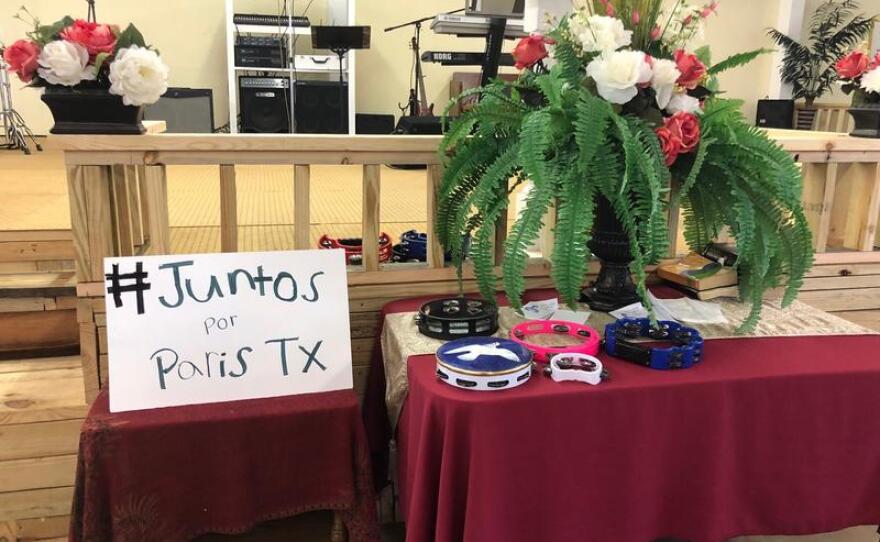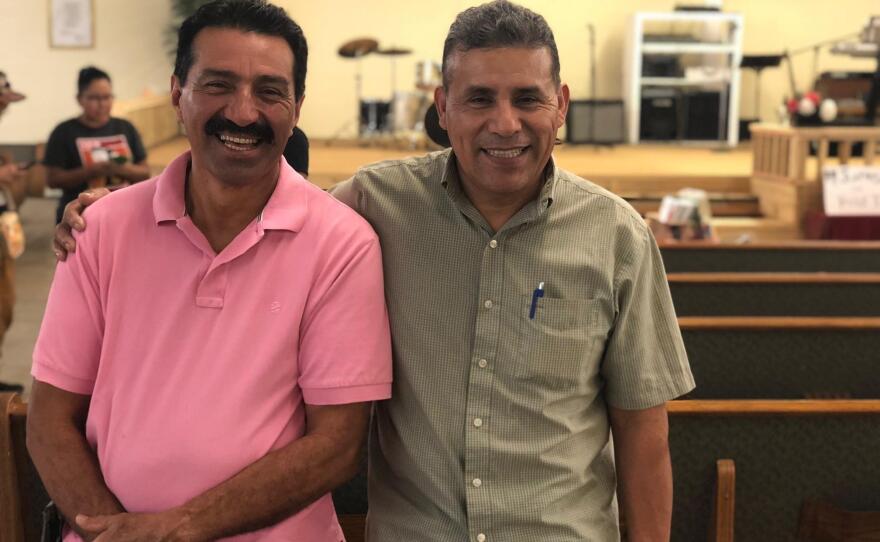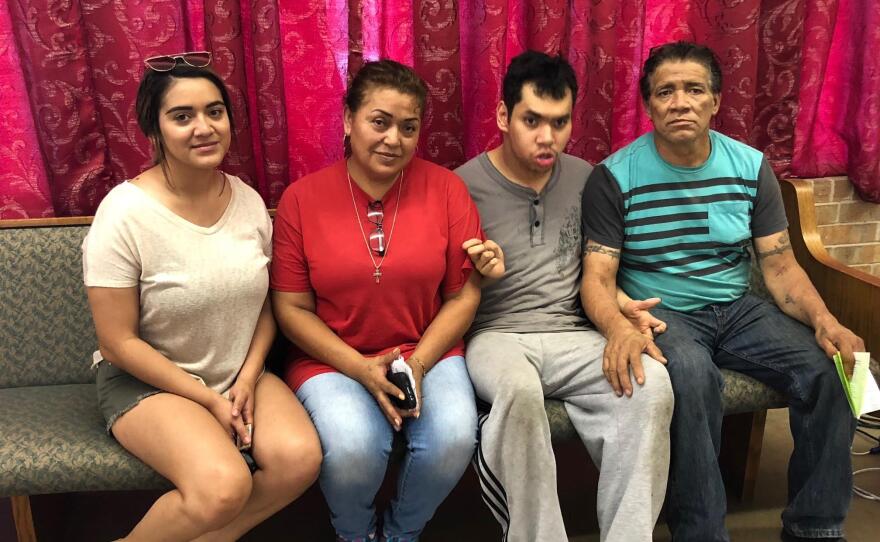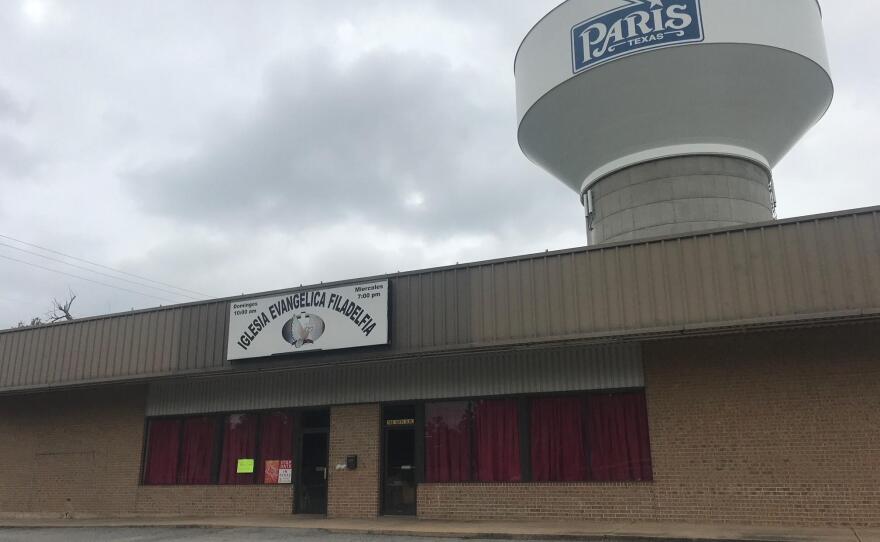From the outside, the brick and metal building in Paris looks like any other storefront. But inside, Iglesia Evangelica Filadelfia has become a place of refuge.
This church is not just a house of worship. It’s where immigrants caught up in a raid at a trailer factory — and their family members — have gone seeking information, financial aid and comfort.
Last month, U.S. Immigration and Customs Enforcement agents descended on Load Trail in the nearby town of Sumner. ICE arrested 159 workers on immigration violations, including charges of using false work and immigration documents.
Dalila Reynoso says the church is a safe space for many of the affected families.
“They’re also getting their needs met for groceries, or food, things they may need at home while they’re waiting,” said Reynoso, as she shows a visitor around.
Reynoso is with the group Justice For Our Neighbors of East Texas. She says affected families need help paying their bills.
“What if these families have a house mortgage? You know, if they worked at this plant for 18 to 20 years, they haven’t been paying rent. They’ve been buying their home.,” Reynoso said. “How are they going to pay that mortgage?”
Some families plan to sell their belongings to raise money. The church has set up a GoFundMe account and is also collecting food, bottled water, diapers and hygiene products.
Pastor Beto Prado leads a Spanish-language congregation at nearby First Baptist Church. He was eating with his 7-year-old daughter in her school cafeteria when he got a call the morning of the raid. He told his little girl he loved her and drove 15 minutes to Sumner.
When he arrived, he saw several buses from Immigration and Customs Enforcement. ICE agents stood at every gate and door of the plant.
“I took some videos and it took me a little while to really believe that,” Prado said. “I know it was real because I was seeing that with my eyes, but it took me a little while to really understand all what was going on.”
Prado tears up when he talks about the families affected by the raid. His biggest question is what’s going to happen to them. Some had more than one relative who worked at Load Trail.
“If the bond is $5,000 or $7,000 — so you know, seven times two — it’s a lot of money to come up with in a day or two days,” Prado said. “And I know families who have three members in the family that were detained, and it’s a lot of money.”
ICE has charged some of the immigrants arrested with using fake documents, like visas and immigration papers. Officials have said the raid was the largest at a single site in a decade.
Prado, who’s originally from Mexico, says he understands deporting people who’ve committed serious crimes. But he doesn’t think the majority of immigrants arrested at Load Trail fall into that category.
“Most of these families, because I know them, they go to work, they come home and they are a good people,” Prado said. “So I do think that we as a people — we as Americans — have the heart to help them, and I say, ‘Let’s help them.’”
Those are comforting words for Miguel Oliva Esquivel, who worked at Load Trail. On a recent Saturday afternoon, the 62-year-old and his family stopped by the church, Iglesia Evangelica Filadelfia, seeking help.
He and his wife have three adult children – one of them has special needs.
Esquivel says that when ICE arrested him, all he could do was think about his wife and son. He pays for everything in the house — food, diapers, cleaning supplies.
Load Trail officials say they were surprised by the raid and are cooperating with ICE. They say they’ve also set up a fund to help families affected by the raid.
Isabel Cruz, an immigration attorney from Dallas, has been helping some of those families.
She says many immigrants like Esquivel have worked in the U.S. for years and should be spared deportation.
“There’s all these other considerations,” Esquivel said. “They have formed this community. They have certainly supported it financially with their living here, with raising their families here, businesses, everything.”
In most of these raids, Cruz says, it’s not just the worker who’s affected. It’s an entire family.
One family's story after the immigration raid
Miguel Oliva Esquivel was outside at work when he heard a helicopter flying overhead.
"What’s with the helicopter?" he wondered.
“En eso quedó porque tenía yo cuatro, cuatro atrás de mí,” he recalled. “Dice muévase para adentro.”
Four U.S. Immigration and Customs Enforcement agents were behind him.
“Go inside,” one of them said.
“Quién es?” Esquivel asked who they were.
“Immigration. Go inside.”
ICE arrested 159 people on immigration violations on Aug. 28 at Load Trail, a trailer factory, in the Northeast Texas town of Sumner. Officials have said the raid was the largest at a single site in a decade. Five people were released for humanitarian reasons. And as of last week, 98 had been released on bond.
Esquivel was held in Johnson County and released after his family paid a $5,000 bond.
Sitting on a bench inside Iglesia Evangélica Filadelfía, a church in Paris, Texas, Esquivel says he’s worried about his wife and three adult children, especially his 26-year-old son with special needs.
“Por que yo soy el que mantiene la casa. Soy el que compra todo lo que es de mis hijos. La comida, pañales,” he says.
He’s the one who provides for the household, the one who buys everything for his children — the food, the diapers.
The 62-year-old and his wife, Sonia Garcia, have two other adult children — both have DACA status. That’s Deferred Action for Childhood Arrivals, which allows undocumented children who were brought to the U.S. by a parent to stay in the country and work.
The couple met in Mexico City and came to the U.S. over 20 years ago. Like many immigrants, they came seeking new opportunities.
“Primero que nada que, donde yo vivía había muchas problemas, demasiada bandas…"
He says there were a lot of problems, including gangs, where he lived. He didn’t care what happened to him. Esquivel says he just wanted his family to have a better life.
Esquivel came from a family of 10. His father would often tell him and siblings this:
“Que hay que luchar en la vida. Que para atrás, ni para tomar impulso.”
It basically means: “You have to try in life. Not go back, even if it’s to gain momentum.”
Esquivel worked at Load Trail for five years and has had other jobs before that, including roofing. He’s fallen from a two-story house. And he’s had other job-related injuries. In one, he lost three fingers.
“No he demandado, no nada. Por qué? Por que me gusta trabajar, ganarme el dinero honradamente.”
He says he hasn't sued because he likes to work and earn money honestly — not with accidents.
Mexican Consulate officials have been helping families like Esquivel’s navigate the legal system. Francisco de la Torre, Mexico’s Consul General in Dallas, says after the raid, his office deployed staff to the sites where people were being detained.
“We do not encourage Mexicans to come here without documents to look for work," he says. "But we have the moral and the legal obligation to protect their legal rights, to protect their human rights with no disregard of the legal status they have. They have human rights.”
Sayra Oliva, Esquivel’s 28-year-old daughter, says she appreciates the help from the community. But she’s heartbroken.
“We’ve been here most half of my life here — 21 years. All my family is," she says. "And to know that we don’t have a chance, I mean like, it’s not our fault our parents brought us here. It was to have a better life.”
Oliva’s younger brother with special needs doesn’t have DACA status, so she’s bracing herself for the possibility that her parents and brother with have to leave the country.
Since the immigration raid, she says many people she knows are afraid. Her parents, for example, have asked her to run errands for them. General Consul de la Torre says he’s also heard from people who don’t want to go out.
“The word is fear. Many people are in fear," he said. "Many people think ICE is still knocking on doors. We know that’s not true, but people tend to believe what they hear on the street.”
Oliva’s dad has to appear in immigration court next week. She says whoever decides his fate will be compassionate.
“I’m just hoping and praying that he gets a judge that has a heart and gives him a chance to stay or at least get a work permit," she said.
Oliva also hopes the community, her neighbors, and people who’ve never met her or her family try to understand her family’s plight.
“I know we did, I guess, our parents did something wrong," she said. "But they’re not here to hurt anyone. They’re just here to better our lives and have a better future.”





